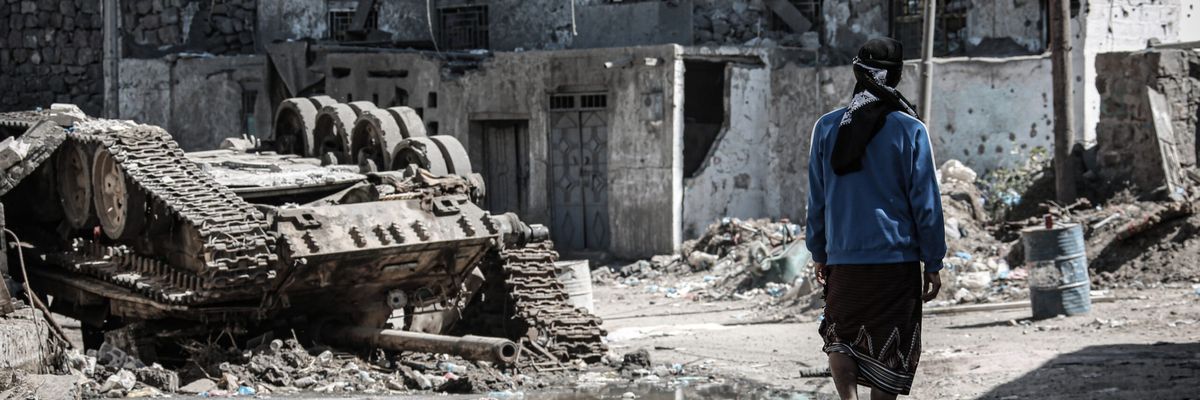The U.N.'s announcement of a two month truce between the Saudi-led coalition and Yemen's Houthi rebels is welcome news, especially prior to the start of the Muslim holy month of Ramadan this weekend.
The terms of the truce include the following: The parties will halt all offensive military air, ground, and maritime operations inside Yemen and across its borders. The Saudis will allow fuel ships to enter into Hodeidah ports (no fuel has reached Hodeidah since January 2022). The Saudis will allow commercial flights to operate in and out of Sana’a airport, which has been effectively inoperable since 2015.
U.N. Special Envoy for Yemen Hans Grundberg also announced that he would oversee additional talks to open roads in Taiz and other governorates in Yemen. The city of Taiz has been under a Houthi siege since 2015. Grundberg affirmed that the truce could be renewed beyond the two-month period with the consent of the parties. Observers will now be watching to see if both sides maintain the ceasefire and if the Saudis allow ships to enter Hodeidah port and planes to fly in and out of Sana’a.
On March 26, following their successful attack on Aramco oil facilities near Jeddah, the Houthis announced a unilateral ceasefire on trans-border attacks as well as ground operations inside Yemen. They said that if the Saudis lifted their blockade on Houthi-controlled air and seaports, the ceasefire would continue.
The Saudis responded with their own ceasefire announcement on March 29, to correspond with the inter-Yemeni talks they coordinated in Riyadh. The Houthis had refused to join the talks because they were being held in Saudi Arabia, but had said they would be willing to join talks held in a neutral country, such as Kuwait or Oman. This general atmosphere of detente appears to have contributed to the U.N.’s success in pushing for the two-month truce, which they had previously expressed hopes for securing.
Previous ceasefires have broken down because neither side had adequate incentives to maintain them. The difference this time may be that the Houthis have demonstrated a consistent ability to damage Saudi energy infrastructure and the Saudis have concluded that even with additional U.S. provided Patriot anti-missile systems, the risk to their economy is too great. The UAE likely made a similar calculation after Houthi drones struck Abu Dhabi in mid-January, puncturing the Emirates' carefully curated image of safety and stability. Even with guarantees of U.S. defense assistance, no existing anti-missile or anti-UAV system can eliminate the risk posed by missiles and drones.
The Biden administration should make clear to the Saudis that if they break the ceasefire, Washington will be forced to reconsider the military support it provides to Riyadh. Unfortunately, the United States lacks a working relationship with the Houthis and therefore has few means of pressuring them to maintain the ceasefire. However, the Saudis' commitment to allow ships to enter the port of Hodeidah and planes to enter Sana'a airport would meet the Houthis’ demands for extending their ceasefire.
Additional pressure on the Saudis to maintain the ceasefire may have come from the recent announcement from members of the U.S. Congress that they would reintroduce a War Powers Resolution to end U.S. support for Saudi military actions in Yemen. Without the assistance of U.S. military contractors, two thirds of the Saudi Air Force would be unable to fly.
Additional pressure on the Saudis to adhere to the truce may come from the recent announcement from members of the U.S. Congress that they would reintroduce a War Powers Resolution to end U.S. support for Saudi military actions in Yemen. In 2019, Congress successfully passed a similar War Powers Resolution, but President Trump vetoed it. Without the assistance of U.S. military contractors, two thirds of the Saudi Air Force would be unable to fly. If the War Powers Resolution were to pass, the Saudis would face the embarrassing prospect of losing U.S. support along with the ability to maintain a functioning air force.
Saudi Arabia has long maintained their interest in exiting the Yemen conflict, but insisted on finding a face-saving means of doing so. The Houthis’ unilateral ceasefire, followed by the Saudis’ ceasefire, now lengthened and affirmed by the UN, may have offered the Saudis a more dignified departure from the brutal seven-year war. Yet given previous failed truces, the durability of the agreement remains to be seen.















